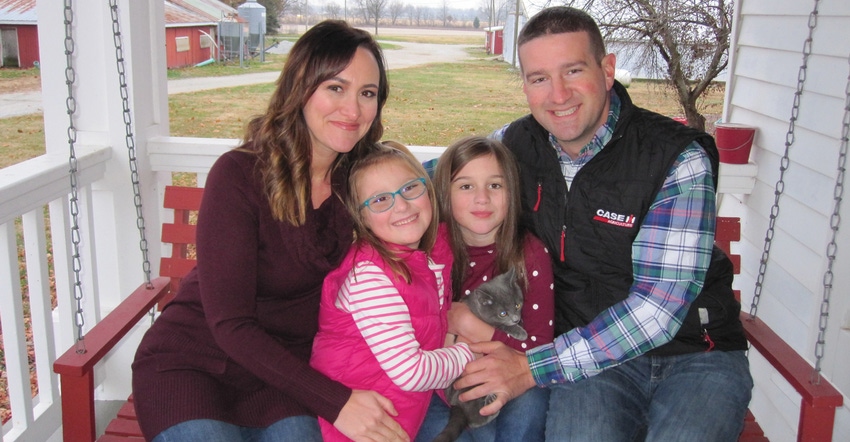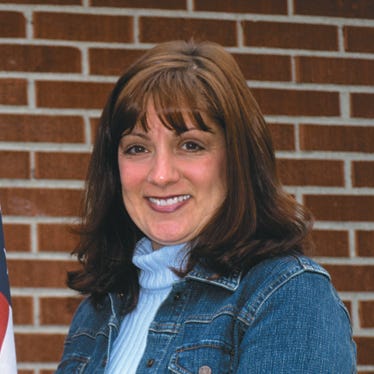December 4, 2019

On a bitter cold morning, Dallas Foster didn’t have to worry about keeping hogs warm within a big operation. The few 4-H calves in the barn near the house might need a bucket of water, but that was nothing compared to what he would be doing if he were still in the hog business. It’s a positive outlook for a man who not long ago was dealing with devastating stress.
A 2004 Purdue University graduate, Dallas’ passion for agriculture grew as he experienced life on a small family farm. Not long after his father got out of farming, Dallas stepped onto the homestead near Greenfield, Ind., determined to grow a successful hog and crop operation.
That looked like a lot of physical work — remodeling, reorganizing, reutilizing and resourcing to get everything more up to date. But Dallas is a man of goals, dreams and tenacity. Eventually, he began to see the fruits of his labor.
In 2016, he and his wife, Meggie, were recipients of the Indiana Farm Bureau Young Farmer Achievement Award and made it to the top 10 in the national contest. The honor came as things were beginning to unravel. Dealing with the death loss of pigs, major cash burn, lender issues and having to lay off employees, Dallas says he felt like he was lying by receiving the award.
Things continued going south, although Dallas was doing all that he could. “The goal posts from the lenders kept being moved, and no matter how I tried, I couldn’t keep up with their demands,” he says.
He hosted an event with then-U.S. Sen. Joe Donnelly. It was the farm’s crowning moment. But after the excitement was over, stress continued to take its toll. He didn’t eat or sleep. He lost 40 pounds.
Dallas was exhausted and struggled with trusting anyone. His wife and friends grew concerned. His sister researched and gave him the option of three therapists. He chose one. This gave him a safe, confidential place to talk openly about struggles. He navigated through negative thought patterns, worrying, hypothesizing; he learned to break things down and think through them rationally, even when there were no real answers.
At the same time that the couple were Featured Farmers on Pork Day at the Indiana State Fair, they were receiving certified letters from creditors.
“We were attempting to smile about pork production while in reality, we were crying about raising pigs,” Dallas recalls.
Life decisions had to be made as to how badly he wanted to farm. He wasn’t willing to hurt anyone in order to so do. He had depleted ideas for how to make things work, and as he bluntly states, “I had to remove the antagonist.”
Tough decision
Dallas had spent his entire life dreaming about farming. He’d gotten an education to prepare for it, and once he was able, spent 13 years building an operation that he watched be liquidated in a matter of three weeks.
But there was a light at the end of the tunnel. Immediately, he landed a job in the construction field, making him appreciate the background he had with heavy equipment and tractors.
Dallas knew his mental health and physical well-being were of far greater value than any farm. Recently, his sister sent him a story about a farmer in the Dakotas who had taken his life. Dallas could relate to the man’s sorrow and desperation.
How symbolic, he thought, that this man had shot himself in the heart. Dallas knows just how fortunate he is to be alive and that his wife isn’t like the widowed woman from the Dakotas, wondering what she is going to do after such a tragedy.
Every once in a while, Dallas finds himself staring at a field and wondering. Sometimes, he searches tractors online. He’s grateful for the time he sought help and even for the short duration he was on medication, although he initially fought the idea.
Dallas says he’s better equipped to deal with stress today. He’s discovered he didn’t have to resurrect the farm in order to know great joy and new experiences. He takes pride in his hard work and success, he says.
“Buildings, machinery and livestock might be good capital, but your body and mind are your greatest asset,” he says.
Dallas was given due praise for his hard work in agriculture, but his willingness to be transparent about his struggles will perhaps leave an even greater impact on agriculture, experts believe.
Willing to share
Dallas shared his story during the Healing in the Heartland symposium in September. The idea for the daylong meeting came from members of the current class of the Indiana Agricultural Leadership Program/AgriInstitute.
Beth Archer, the group’s director, says the members who put that project together wanted to start a dialogue for people who are suffering from stress caused by financial woes and a very challenging growing season.
People like Dallas Foster who are willing to share their experiences helped open that dialogue.
McClain writes from Greenwood, Ind.
About the Author(s)
You May Also Like






